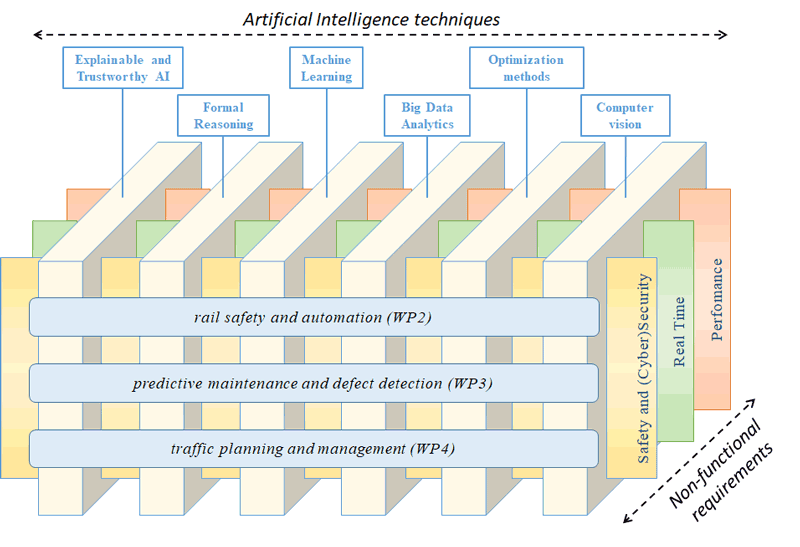by Francesco Flammini (Mälardalen University and Linnaeus University, Sweden), Valeria Vittorini (CINI and University of Naples Federico II, Italy) and Zhiyuan Lin (University of Leeds, UK)
The European RAILS research project is investigating the potential applications of artificial intelligence (AI) within the rail sector, and helping define roadmaps for future research in next generation signalling systems, operational intelligence, and network management.
The overall objective of the Roadmaps for AI integration in the raiL Sector (RAILS) research project is to investigate the potential of artificial intelligence (AI) in the rail sector, and contribute to the definition of roadmaps for future research in next generation signalling systems, operational intelligence, and network management. RAILS will address the training of doctoral students to support the research capacity in AI within the rail sector across Europe by involving research institutions with a combined background in both computer science and transportation systems, in four countries: Italy, United Kingdom, the Netherlands, and Sweden.
RAILS will produce knowledge, ground-breaking research and experimental proof-of-concepts for the adoption of AI in rail automation, predictive maintenance and defect detection, traffic planning, and capacity optimisation. As such, RAILS will effectively contribute to the design and implementation of smarter railways. To this end, RAILS will combine AI paradigms like machine learning with the Internet of Things (IoT) in order to leverage on the big amount of data generated by smart sensors and applications. The research activities will be conducted in continuity with ongoing research in railways, in particular within the Shift2Rail innovation program, and will be based on in-depth analysis of AI applications in transport and other relevant sectors in order to perform a transferability study of available results to railways.
The methodological and technological concepts developed in RAILS are expected to stimulate further innovation in railways, providing new research directions to improve reliability, maintainability, safety, security, and performance. With respect to safety, emerging threats (e.g., adversarial attacks) and certification issues will be addressed when adopting AI in autonomous and cooperative driving (e.g. virtual coupling), based on the concepts of explainable AI (XAI) and trustworthy AI.
With respect to cyber-physical threat detection, innovative approaches will be developed based on AI models like Artificial Neural Networks (ANN) and Bayesian Networks together with multi-sensor data fusion and artificial vision. Resilience and optimisation techniques based on genetic algorithms and self-healing will be addressed to face failures and service disruptions, as well as to increase efficiency and line capacity.
Furthermore, transport management problems, such as timetabling and real-time traffic rescheduling, are notoriously difficult, and commonly referred as to NP-hard problems. This means that solving such problems exactly in large-scale while in practical time limit is often intractable. For these problems, alternative approaches are often needed. For example, heuristic algorithms and evolutionary approaches have been developed for providing near-optimal solutions to transport problems. Recently, machine learning has been applied to solve NP-hard scheduling problems, giving a promising direction as an alternative to heuristics. Therefore, we are interested in alternative AI algorithms in finding good (near-optimal) solutions in practical time for transport problems.
All these techniques will pave the way to the development of the new Railway 4.0.
The project is structured into six work packages (WPs):
- WP1 provides the reference taxonomy and state of the art of AI in railways and related sectors.
- WP2 addresses AI for railway safety and automation.
- WP3 explores AI applications in predictive maintenance and defect detection.
- WP4 is about AI for traffic planning and management.
- WP5 manages dissemination activities as well as definition of future roadmaps.
- WP6 deals with project management.
An overview of the project is provided in Figure 1.

Figure 1: The RAILS project will study current AI techniques and their applications in order to improve railway performance, safety, reliability, and security.
The organisations participating to the project are: Consorzio Interuniversitario Nazionale per l’Informatica (CINI), Italy – project coordinator; Delft University of Technology, the Netherlands; University of Leeds, United Kingdom, and Linnaeus University, Sweden. The project is also supported by an industrial Advisory Board currently including Hitachi Rail STS (IT), Dutch State Railways (NL), The MathWorks (IT), First Rail (UK), Aitek (IT), Comesvil (IT), NextTechnologies (HU), and SYENMAINT (IT). The project is funded by the European Union's Horizon 2020 research and innovation programme (Shift2Rail Joint Undertaking, Open Call S2R-OC-IPX-01-2019) under grant agreement No. 881782. It runs for three years, from 1 December 2019 to 30 November 2022.
Links:
[L1] https://cordis.europa.eu/project/id/881782
[L2] https://rails-project.eu
References:
[1] D. Burroughs: “The future of intelligence is artificial”, International Railway Journal, September 2019, https://kwz.me/h4E
[2] G. Ho, “Artificial intelligence in rail: “Hype or reality?”, Global Railway Review, May 2019, https://kwz.me/h4K
[3] D. Tokody, F. Flammini: “The intelligent railway system theory: The European railway research perspective and the development of the European digital railway strategy”, International Transportation, Issue 1, 2017.
Please contact:
Valeria Vittorini (Project Coordinator)
CINI and University of Naples Federico II, Italy
Francesco Flammini (Technical Manager)
Mälardalen University and Linnaeus University, Sweden











